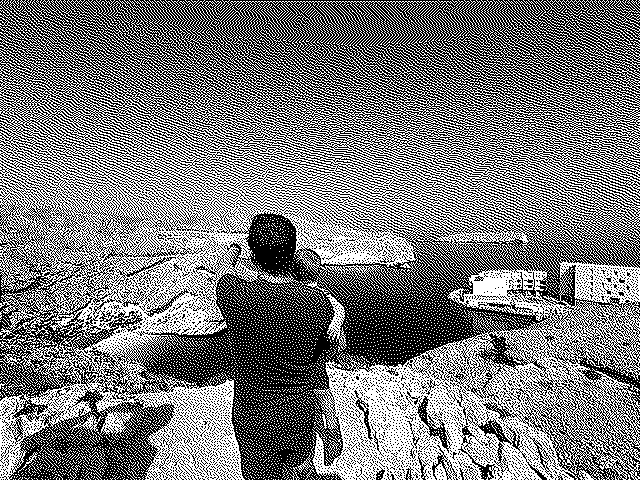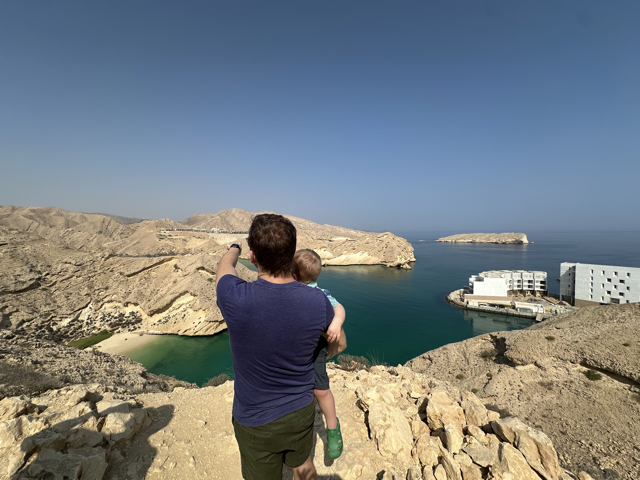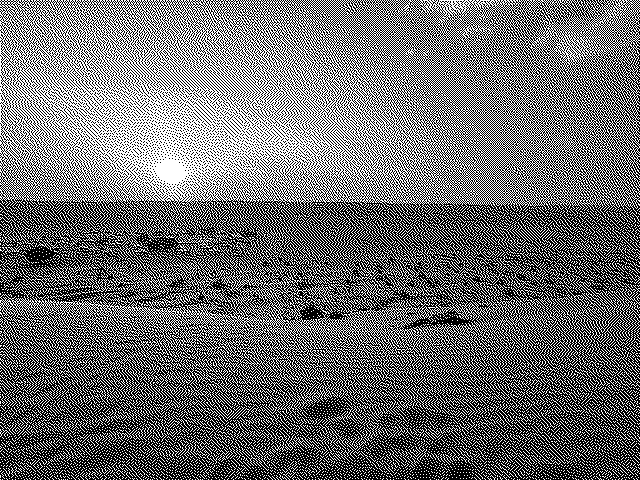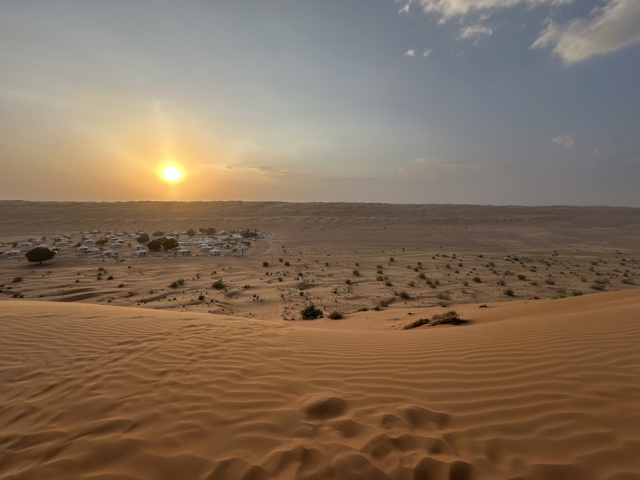When East Becomes West
🗓 posted Oct 24, 2025 by Josh Erb🔢 1648 words
🏷 #travel #oman
Ruminations
I recently remarked to a friend that traveling abroad after the advent of the smartphone feels like studying biology after the advent of microplastics. It has touched every aspect of life. No matter where you point your microscope you will see its impact.
In many ways I feel fortunate to have experienced life outside my own country before digital maps, smartphones, translation apps, and streaming services existed. Discomfort, in hindsight, is a blessing. It cultivates the possibility of deeper experience and appreciation.
I have been lost on unfamiliar streets. I have had to negotiate with aggressive cabbies in countries where I have a loose grasp on the local language. I have had to rely on the kindness of strangers to meet basic needs or resolve simple issues. Most profoundly, I have been confronted with the limitations of my own culture and language. In the moment these hurdles feel impossible to overcome, alienating even. But those feelings fade with time. What remains is the rich awareness of other ways of being.
The world is large. The variations on human experience are near infinite and constantly shifting.
Even with smartphones this fact still remains, of course. Yet it's hard not to feel that something is lost, flattened, when you can arrive in a country, pick-up a rental car, and drive deep into the wilderness without any pangs of anxiety or frustration. Under no threat of ever being lost. The ineffable sense of that an unseen technological imperialism is at work smoothing out the rough edges of the world. A force that homogenizes everything into a single surface which we glide across, leaving no trace and bearing no mark of ever having been there.
Impetus
Of course, all of this introspection is due to the fact that we took another trip West this past month. As part of our time in India, we're trying to capitalize on visiting nearby countries that would otherwise cost a small fortune to visit if we were traveling from the U.S. of A.
This particular trip was to the Sultanate of Oman. From Mumbai, it is a direct, two-hour flight. Or, roughly the same flight time as Washington, DC to Chicago, IL.
Despite being separated by the Arabian sea, the two countries are linked in myriad ways. By geology, as Oman was once part of the subcontinent before it tectonic evolution rent them apart.[1] By history, as archaeological projects have unearthed ceramics with Tamil-Brahmi script dating to 300 BCE. And by migration, since similarly to U.A.E., it's local, native population is quite small but the rapid growth of it's oil driven economy has led to large capital investments and demands for labor, of this migrant population the largest subgroup is Indian men.
Oman is not a place that has historically been open to tourism, as I understand it. But over the past decade or so it has taken steps to nurture the growth of this sector of its economy. A pragmatic policy for a country that currently derives 71 percent of government revenue from oil and gas. Similar to Dubai, our U.S. passports meant we received 14-day visas for free on arrival.
Impressions
Having grown up in the United States during the post-9/11 years, I have been conditioned to think of Gulf countries as "Middle East" or the "Near East." How funny then to be in a position where they are the near West.
What's more, as with most trips outside of India after living here a while, it's impossible to decouple my first impressions of Oman from the feeling of "emptiness" that I now feel whenever we leave. The total population of Oman is around 5.5 million people. The estimated population of the Mumbai metropolitan are is 26 million. Anywhere else in the world feels sparsely populated.
Our itinerary was relatively simple: coast, desert, then back to coast. We arrived in the capital and largest city, Muscat, and drove our car East to a resort nestled into the jagged hills of the coast. All around us we saw signs of the economic influence of other nations. Our first resort was a Chinese luxury brand, filled with Indian, European, & Russian families. When we interacted with anyone and they realized we were from the U.S. they were typically surprised, saying things like, "That's a long way to travel for vacation." As we drove, we passed a large billboard thanking the Trump Administration for it's investment in a highway infrastructure project.


In October, the heat of summer has begun to break. The dry climate peaked at 88° F and was cool in the evenings. The absence of humidity was a welcome change. However, the sun was direct and unobscured by clouds, we spent most of our time lathering sunscreen on ourselves and our toddler.
After a few days of sitting on the beach, we drove 2.5 hours South to the desert. This leg of the journey was the main reason we rented a car. The resort was an upscale, glamping operation. 10 kilometers off-road by a small village named Al Wasil (الواصل). The resort said we would need 4-wheel drive and they weren't lying. As I white-knuckled through the sandy landscape, I was reminded of driving on unplowed roads in Illinois after a heavy snow.


The desert in Oman brought back memories of visiting the Sahara in Morocco nearly 14 years ago. Of course, it was also very different. We slept in a room with air conditioning. We had a shower after we stood on the top of the dune and heavy wind filled every crevice of our bodies with sand. A lot has changed since then.
Our one night in the desert we had dinner outside under a sky full of stars. It's been a while since I've seen stars and had the time to look at them. I tried Omani halwa which was different from any I had had before. I enjoyed the coffee that they mix with cardamom powder and serve in thimble-sized cups. As we ate, a live band played local music until an Italian tourist asked them to play "Bella Ciao" and everyone laughed and clapped along.
We ended the trip with a brief stay at another resort on the coast. This one closer to the airport in a development alcove that felt artificial and misplaced. As we drove down the impeccably manicured, private streets I felt another tinge of the hyperreal. A sense of a wealth and incentives that flourish at the expense of community and culture. Places paved over and built up for the benefit of a privileged few.
Sitting at a swim-up bar in the pool on our final day, I ordered a cocktail. A luxury that comes with the awareness that while alcohol is legal in Oman, it's sale and consumption are primarily limited to hotels and restaurants that cater to the tastes of Western tourists.
The Oman Rial is strong, currently worth 2.6x more than the U.S. dollar. Cost of living is high, but not quite as high as it is in U.A.E. Coming from Mumbai, where you can take an auto-rickshaw a couple kilometers for less than a dollar, I balked when a 10 minute cab ride cost me $14, but on reflection this is close to the costs I was used to when I lived in DC. I realized just how quickly my own sense of the value of things can shift. There are reasons goods & services in India cost much less and most if not all are unpleasant.
Oman was a beautiful country. The few locals I managed to talk with were friendly and didn't scowl when I offered a poorly pronounced phrase in Arabic. The cabby complained to me about afternoon traffic on Thursdays because "everyone goes home to their villages."
Subjectivity
It's possible that all of my misgivings about the differences in cross-cultural experiences are not just an artifact of technological development. In fact, it's likely that they're primarily a consequence of the fact that I have traveled more, that I studied Arabic in college, and the traveling to a country where I'm partially familiar with customs & language is inherently going to feel more comfortable than it did when I first stepped into the unknown.
It's also true that becoming a parent has forced me to prioritize predictability and comforts that are compatible with the routines and demands of a toddler.
I've mentioned it in other posts, but living in India under our current circumstances has forced us up into a higher class. Even with our travel to nearby countries, we are staying in places that I typically wouldn't even consider when planning a trip.
Our lives have temporarily taken on the characteristics of wealth and all the privileges that come with it. I can't help but feel like it dilutes the experience of these places. It hampers our understanding of the world as we move through it. With money there is no discomfort or uncertainty. There are fewer opportunities to cultivate deeper cultural understanding.
I'm sure it's a confluence of all this and more.
Back in Mumbai, the city has been celebrating Diwali all week. Apartment balconies are covered in colorful, twinkling lights. Every street corner has a gaggle of people setting of weapons-grade fireworks from 6 PM to midnight. An abrupt, jarring transition from the quiet solitude of the Omani desert.
This fact is courtesy of an official government sponsored coffee-table book on the geological history of Oman that was in one of our hotel rooms.
<< all notes.